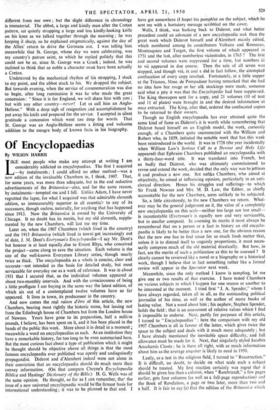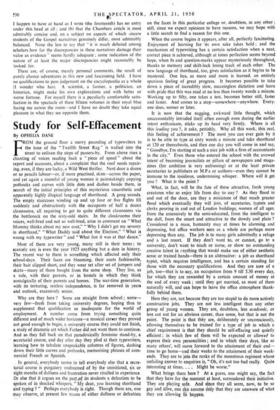Of Encyclopaedias
By WILSON HARRIS
LIKE most people who make any attempt at writing I am considerably addicted to encyclopaedias. The first I acquired —by instalment's ; I could afford no other method—was a new edition of the invaluable Chambers in, I think, 1907. That, for some years, was more than adequate, but in the end seductive , advertisements of the Britannica—also, and for- the same reason, by instalments—tempted me and I fell. Unlike Adam, I have never regretted the lapse, for what I acquired was that admirable eleventh edition, so immeasurably superior in all essentier to any of its successors, though useless, naturally, for anything that has happened since 1913. Now the Britannica is owned by the University of Chicago. It no doubt has its merits, but my old eleventh, supple- mented by the new Chambers, will last me my time.
Later on, when the 1907 Chambers (which lived in the country) and the 1913 Britannica (which lived in town) got increasingly out of date, J. M. Dent's Everyman's Encyclopaedia—I say Mr. Dent's but honour is at least equally ,due to Ernest Rhys, who conceived the project—came along to save the situation. Each volume is the size of the well-known Everyman Library series,- though nearly twice as thick. The encyclopaedia as a whole is concise, clear and accurate—not intended as the basis for detailed study, but most serviceable for everyday use as a work of reference. It was in about 1931 that I secured that, as the individual volumes appeared at about two-monthly intervals. And with the consciousness of being a little profligate I am buying in the same way the latest edition, of which six out of a contemplated twelve volumes have so far appeared. It lives in town, its predecessor in the country.
And now comes the real raison d'être of this article, the new Chambers, bearing most rightly the historic name, but issuing not from the Edinburgh house of Chambers but from the London house of Newnes. Years have gone to its preparation, half a million pounds, I believe, has been spent on it, and it has been placed in the hands of the public this week. More about it in detail in a moment ; meanwhile a word on encyclopaedias as such. As an institution they have a remarkable history, far too long to be even summarised here. But the most curious fact about a type of publication which it might be thought should be objective above all things is that the most famous encyclopaedia ever published was openly and undisguisedly propagandist. Diderot and d'Alembert indeed were not alone in their conviction that an encyclopaedia should do much more than convey information. (Oh that compare Cheyne's Encyclopaedia Biblica and Hastings' Dictionary of the Bible.) H. G. Wells was of the same opinion. He thought, so far as I can remember, the the issue of a new universal encyclopaedia would be-the firmest basis for international understanding ; it was to be planned to that end. I have got somewhere (I hope) his pamphlet on the subject, which he sent me with a hortatory message scribbled on the cover.
Wells, I think, was harking back to Diderot, and what better precedent could an advocate of a new encyclopaedia seek than the great work which Diderot himself and d'Alembert mainly edited, which numbered among its contributors Voltaire and Rousseau, Montesquieu and Turgot, the first volume of which appeared in 1751 and the last, after numberless vicissitudes, in 1765 ? The first and second volumes were suppressed for a time, but numbers iii to vii appeared in due course. Then the sale of all seven was stopped, and though viii, ix and x did in fact follow, the attempted confiscation of every copy resulted. Fortunately, at a little supper at the Trianon, Mme. de Pompadour having remarked that she had no idea how her rouge or her silk stockings were made, someone said what a pity it was that the Encyclopedie had been suppreiied. The King thereupon sent for a copy, and 21 volumes (10 of text and 11 of plates) were brought in and the desired information at once extracted. The King, after that, ordered the confiscated copies to be returned to their owners.
Though no English encyclopaedia has ever attained quite the same kind of fame as Diderot's it is worth while remembering that Diderot based himself on an English model, the work, curiously enough, of a Chambers quite unconnected with the William and Robert who, in 1859, initiated the notable work that has this week been reintroduced to the world. It was in 1728 (the year incidentally when William Law's Serious Call to a Devout and Holy Life appeared) that Ephraim Chambers published an encyclopaedia with a thirty-four-word title. It was translated into French, but so badly that Diderot, who was ultimately commissioned to revise and extend the work, decided that the only way was to jettison it and produce a new one. But unlike Chambers, who aimed at objectivity, he aimed at inftnencing opinion, particularly in an anti- clerical direction. Hence his struggles and sufferings—to which Sir Frank Newnes and Mrs. M. D. Law, the Editor, as chiefly accountable for the new Chambers, seem unlikely to be subjected.
So, a little circuitously, to the new Chambers we return. What- ever may be the general judgement on it, the value of a completely new encyclopaedia on this scale—neither too large nor too small— is incontestable (Everyman's is equally new and very serviceable, but in smaller compass). In assessing its merits it must always be remembered that on a person or a fact in history an old encyclo- paedia is likely to be better than a new one, for the obvious reason that the new one has to find space for so much fresh matter that, unless it is to distend itself to ungainly proportions, it must neces- sarily compress much of the old material drastically. But how, in fact, are the merits of such a publication as this to be assessed ? It clearly cannot be reviewed like a novel or a biography or a historical work, though I believe that in fact something rather like a formal review will appear in the Spectator next week.
Meanwhile, since the only method I know is sampling, let me give one or two results of that exercise. I have tested Chambers on various subjects in which I happen for one reason or another to be interested at the moment. I tried first " J. A. Spender," whom I have always regarded, taken all in all, as the outstanding political journalist of his time, as well as the author of many books of lasting value. Not a word about him ; his nephew, Stephen Spender, holds the field ; that is an assessment of relative values whicn 1 find it impossible to endorse. Next, partly for purposes of this article, I turned to " Encyclopaedias " ; here the comparison with my old 1907 Chambers is all in favour of the latter, which gives twice the space to the subject and deals with it much more adequately ; but I have already mentioned the inevitable space difficulty, and full allowance must be made for it. Next, that singularly styled Jacobin Anacharsis Cloots ; he is there all right, with as much information about him as the average enquirer is likely to need in 1950.
Lastly, as a test in the religious field, I turned to " Resurrection." It is difficult, no doubt, to decide on what scale such a subject should be treated. My first reaction certainly was regret that it should be given less than a columri, when " Rembrandt," a few pages earlier, gets four columns (as well as a full-page reproduction) and the Book of Revelation, a page or two later, more than two and a half. It is fair to say (a) that the edition of the Britannica which
I happen to have at hand as I write (the fourteenth) has no entry under this head at all ; and (b) that the Chambers article is most admirably concise and, on a subject on aspects of which sincere students of the Gospel narratives genuinely differ, most admirably balanced. None the less to say that " it is much debated among scholars how far the discrepancies, in these narratives damage their value as evidence " seems hardly adequate ; some indication of the nature of at least the major discrepancies might reasonably be looked for.
These are, of course, merely personal comments, the result of purely chance adventures in this new and fascinating field. I have no qualifications to pass judgement on the encyclopaedia as a whole (I wonder who has). A scientist, a farmer, a politician, an historian, might make his own explorations and with better or worse fortune. For myself there is a peculiarly comfortable satis- faction in the spectacle of these fifteen volumes in their royal blue facing me across the room—and I have no doubt they take equal pleasure in what they see opposite them.







































 Previous page
Previous page